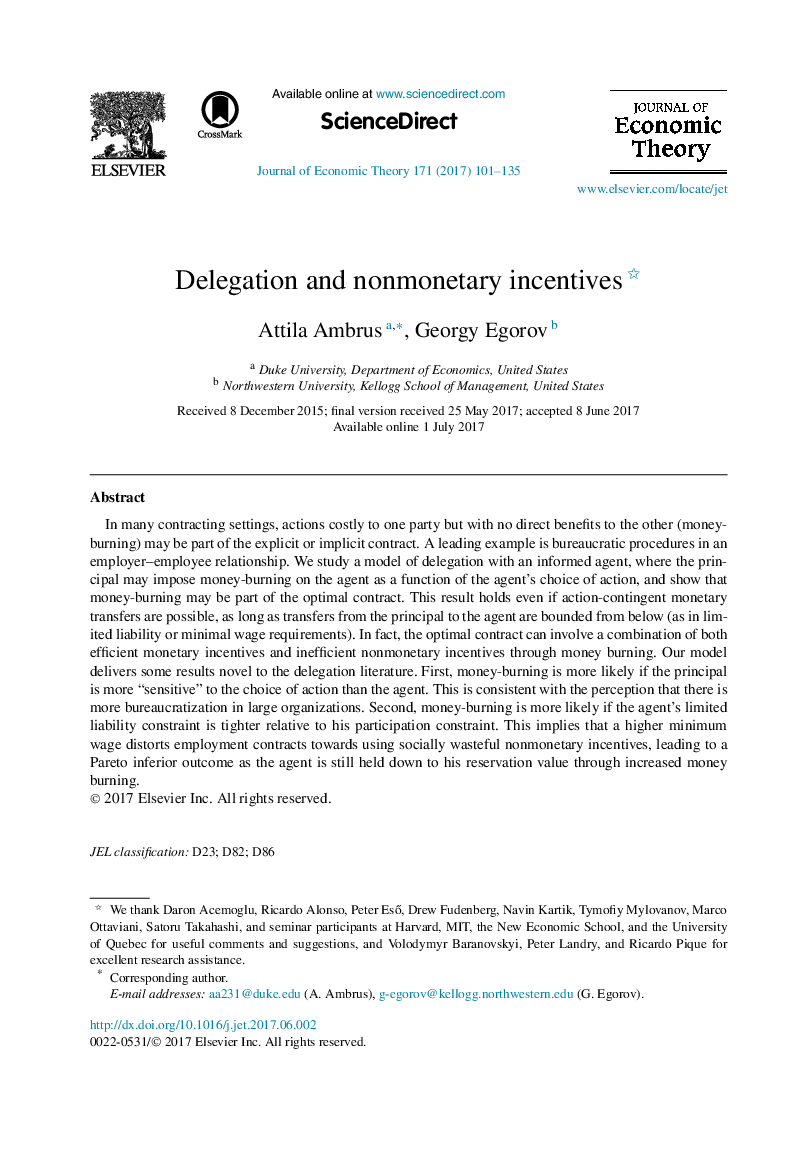| کد مقاله | کد نشریه | سال انتشار | مقاله انگلیسی | نسخه تمام متن |
|---|---|---|---|---|
| 5100062 | 1478734 | 2017 | 35 صفحه PDF | دانلود رایگان |
عنوان انگلیسی مقاله ISI
Delegation and nonmonetary incentives
ترجمه فارسی عنوان
نمایندگی و انگیزه های غیر بانکی
دانلود مقاله + سفارش ترجمه
دانلود مقاله ISI انگلیسی
رایگان برای ایرانیان
ترجمه چکیده
در بسیاری از تنظیمات قرارداد، اقدامات هزینه ای برای یک طرف است، اما بدون هیچ مزایایی مستقیم برای دیگر (سوزاندن پول) ممکن است بخشی از قرارداد صریح یا ضمنی باشد. مثال پیشین، رویه های اداری در روابط کارفرما و کارمند است. ما یک مدل از هیئت مدیره را با یک عامل آگاهانه مطالعه می کنیم که در آن مدیر عامل می تواند به عنوان نماینده به عنوان عامل انتخاب انتخاب عامل عمل کند و نشان دهد که سوزاندن پول ممکن است بخشی از قرارداد بهینه باشد. این نتیجه حاکی از آن است که ممکن است انتقال پول های احتمالی به صورت عملی صورت پذیرد، مگر اینکه انتقال از طرف اصلی به عامل از پایین به پایین (همانطور که در مسئولیت محدود یا حداقل الزامات دستمزد) محدود می شود. در واقع، قرارداد بهینه می تواند ترکیبی از انگیزه های کارآمد پولی و انگیزه های غیرمولد غیرمالی را از طریق سوزاندن پول به همراه داشته باشد. مدل ما برخی از نتایج رمان را به ادبیات هیأت ارائه می دهد. اول، سوزاندن پول بیشتر احتمال دارد اگر مدیر بیشتر حساس است؟ به انتخاب عمل از عامل. این سازگار با ادراکاتی است که بوروکراسی بیشتری در سازمان های بزرگ وجود دارد. ثانیا، اگر محدودیت مسئولیت محدود عاملی نسبت به محدودیت مشارکت خود، احتمال بیشتری برای سوزاندن پول وجود دارد. این بدان معنی است که حداقل دستمزد بالاتر، قراردادهای کاری را نسبت به استفاده از انگیزه های غیرواقعی اجتماعی منصفانه منحرف می کند، که منجر به نتیجه نزولی پارتو می شود، زیرا عامل از طریق افزایش هزینه های مالی، ارزش خود را حفظ می کند.
موضوعات مرتبط
علوم انسانی و اجتماعی
اقتصاد، اقتصادسنجی و امور مالی
اقتصاد و اقتصادسنجی
چکیده انگلیسی
In many contracting settings, actions costly to one party but with no direct benefits to the other (money-burning) may be part of the explicit or implicit contract. A leading example is bureaucratic procedures in an employer-employee relationship. We study a model of delegation with an informed agent, where the principal may impose money-burning on the agent as a function of the agent's choice of action, and show that money-burning may be part of the optimal contract. This result holds even if action-contingent monetary transfers are possible, as long as transfers from the principal to the agent are bounded from below (as in limited liability or minimal wage requirements). In fact, the optimal contract can involve a combination of both efficient monetary incentives and inefficient nonmonetary incentives through money burning. Our model delivers some results novel to the delegation literature. First, money-burning is more likely if the principal is more “sensitive” to the choice of action than the agent. This is consistent with the perception that there is more bureaucratization in large organizations. Second, money-burning is more likely if the agent's limited liability constraint is tighter relative to his participation constraint. This implies that a higher minimum wage distorts employment contracts towards using socially wasteful nonmonetary incentives, leading to a Pareto inferior outcome as the agent is still held down to his reservation value through increased money burning.
ناشر
Database: Elsevier - ScienceDirect (ساینس دایرکت)
Journal: Journal of Economic Theory - Volume 171, September 2017, Pages 101-135
Journal: Journal of Economic Theory - Volume 171, September 2017, Pages 101-135
نویسندگان
Attila Ambrus, Georgy Egorov,
